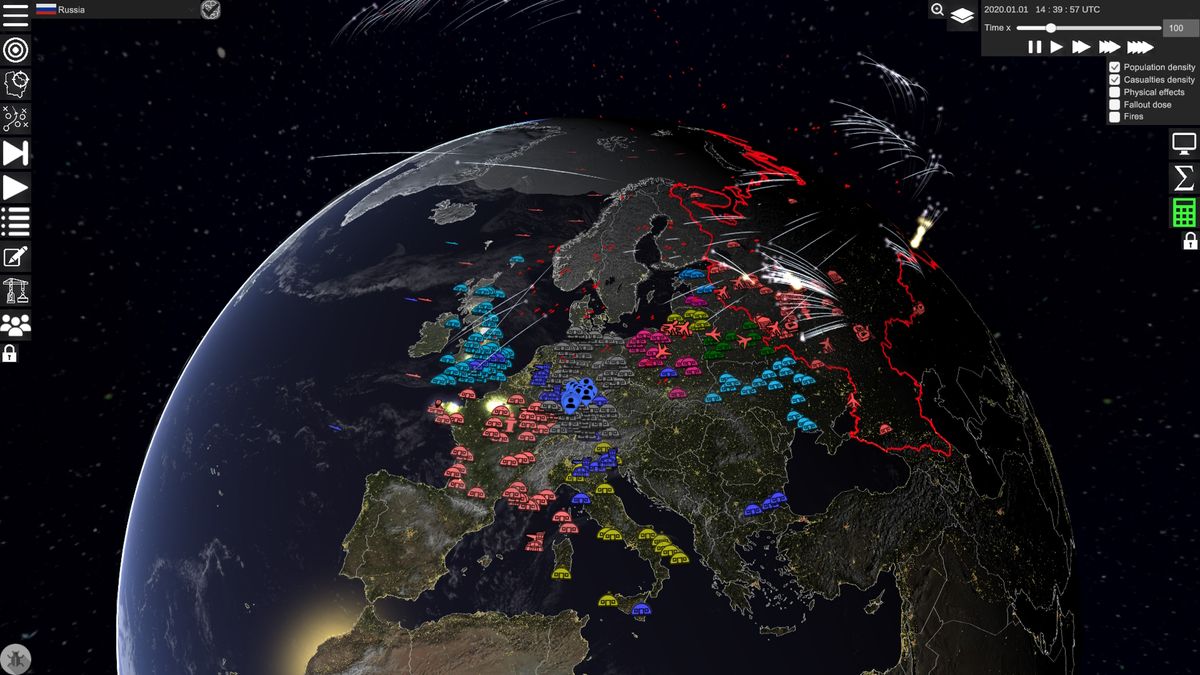At first glance, Nuclear War Simulator, which launched today on Steam, bears a real resemblance to DEFCON, the old (and excellent) Wargames-inspired strategy sim about turning the planet into a roasted chestnut. In reality, it’s something quite different, and not really a game at all: It’s “a detailed realistic simulation and visualization of large-scale nuclear conflicts with a focus on humanitarian consequences.”
Nuclear War Simulator was developed by Ivan Stepanov and originally released in 2020 as a “professional tool” sandbox simulator capable of accurately modeling everything from real-life weaponry to defense systems, blast results, firestorms, fallout, civilian and military casualties, soot thrown into the atmosphere—well, you get the idea. And it’s been used at pretty high levels. Princeton University’s Program on Science and Global Security, for instance, used Nuclear War Simulator to underpin its own research into nuclear war scenarios between the US and Russia.
Now it’s available on Steam, with an impressive (although not what I’d call “fun”) feature list:
- Detailed effects of nuclear weapons, accurate reports on affects/results (including but not limited to radiation zones, casualties and fires)
- Realistic delivery systems, up-to-date full known arsenal of main world powers.
- Sandbox to design weapon systems and build conflict scenarios.
- Individual civilians moving on the map and taking shelter.
- 22+ predefined editable scenarios.
- In-game mod upload and download. (instant synchronisation)
- Adjustable AI.
- Integrated early warning and Missile Defence systems.
“This software should help you answer the question: what will happen if Russia and the United States or India and Pakistan use their arsenals?” the Steam page says, boldly ignoring the easy answer that those things would be very bad indeed. “You can design warheads, missiles and carriers, place them on the map, and execute attack plans to tell a credible story about how nuclear conflicts play out and what are the consequences. Using a high-resolution population density map and realistic weapon effects like blast, heat and radiation you can make an estimate of how many people will die in a conflict.”
The first of a six-part series of brief documentary videos shared by Matrix Games uses the ongoing war in Ukraine to demonstrate Nuclear War Simulator’s capabilities. It’s clinical, yet surprisingly harrowing:
Speaking to PC Gamer, developer Stepanov said the Steam version of Nuclear War Simulator has been upgraded considerably from the original release, to make it both more detailed and more accessible.
“While this software is not a game in the classical sense (there are no predefined goals and no rewards) the user interface is intentionally very similar to a game and should be familiar to most people,” Stepanov said. “The simulation now has a number of tutorials teaching basic functions and there are 30 premade scenarios coming with the simulation so that new users can jump in without any expert knowledge.
“If you want to create scenarios yourself, there is now a database of all currently deployed (unclassified) types of nuclear weapons and there are databases of where the weapons are stationed. With only a few clicks, users can place all US and Russian nuclear weapons at their real location. Then, an AI can be activated to run the scenarios with minimal input.”
While the Steam release of Nuclear War Simulator has come a long way compared to the original standalone version, Stepanov has a number of ideas about how to continue developing it, ranging from improvements to graphics and UI to the addition of new nuclear strike effects and the expansion of civilian and military asset databases. He’s also looking at improving the depiction of individual humans in the sim, “to make the simulation more personal.”
Steam Workshop support is also a possibility, although Nuclear War Simulator already has mod support through mod.io, where you can find add-ons like Cold War (Mid ’50s), Taiwan Strait Hypothetical, Romanian Infrastructure Multi Plans, and various loading screens.
As for what prompted him to release it on Steam in the first place, Stepanov said Nuclear War Simulator is an “educational sandbox” similar to games like Kerbal Space Program or SpaceEngine. Both of those games have found sizable audiences on Steam, and he hopes NWS will be of interest to the general public too.
“Computer games are some of the most important sources of education today,” Stepanov said. “One of the goals and one of the biggest challenges when making NWS was to make it not only realistic but also interactive and easy to use by non-experts.
“Nuclear weapons are the biggest threat to human civilization. By releasing NWS on Steam I hope that we can educate as many people as possible on this topic and together contribute to solving this problem and making our world safer.”
Nuclear War Simulator is available now on Steam for $30/£24/€25.
